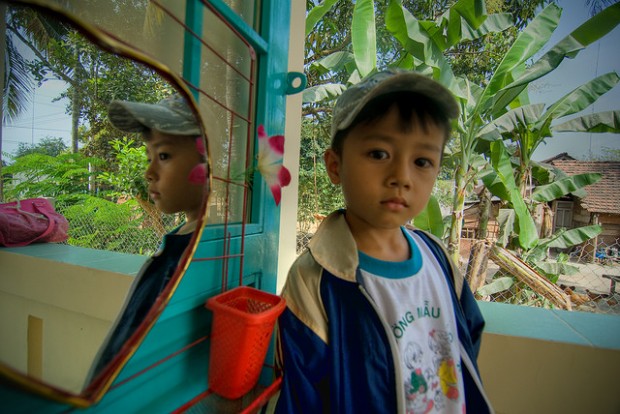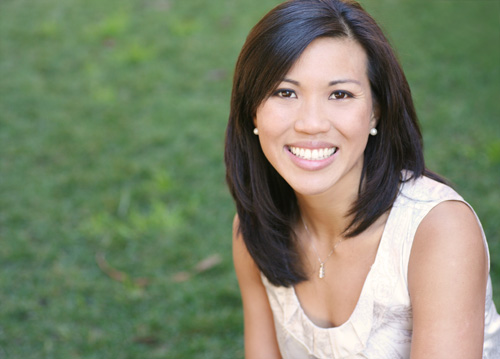
A 94. A 94?! There, on my final 8th grade report card, my Algebra grade had dropped from a 98 to a 94. F&*#!!!!! No doubt, my bum was going to feel some heat when I got home that night.
I, like most other Vietnamese children growing up in America, experienced some sort physical or verbal consequence because my grades weren’t good enough. I had made a careless error on my math homework, I was caught watching TV rather than doing my homework, or I didn’t place in the school science fair. Unless you were that poster child that got A+’s in all subjects, managed to win the state piano competition, and served as President of the Student Council, no ear or rear end was left to be spared.
But in hindsight, those spankings were exactly what I needed. The consistent message from my parents in those spankings, their lectures, and everything else they did for my brother and me was that our education was the single most important thing needed to create a better life for ourselves.
Before I even started pre-school, my dad visited both public and private schools trying to find the best school for us. He interviewed every single one of my teachers before the school year started, and by the time I hit high school, I had already moved three times–all because my dad felt the prior school wasn’t good enough. In one of these occasions, we even moved to a new city before he found a new job. It was all about our education.
In the Vietnamese culture, before we can even walk, our parents try to ingrain the values of an education in us – right behind our most important values of family and respect . . . Yes, it was that important.
Our culture placed greater value on an education than material success. In an American society where we aspire to be the next Warren Buffet, Bill Gates, or Mark Zuckerburg, ancient Vietnamese times placed the Scholar above any entrepreneur, business leader, farmer, or artisan. An education earned you prestige and a way up the social ladder.
Starting as far back as the Ly Dynasty in 1075, performing well on the national imperial exam was the only way to improve one’s social status. Based on the Chinese mandarin system, the Ly Dynasty used the rigorous exam as way to identify the country’s top talent to make them government officials. The exam became a person’s entire existence. It was their only way up.
Even today, receiving an education is the focal point of any Vietnamese household – especially for those of us whose parents fled during the war. How many times have your parents reminded you of the hardship they faced, the sacrifices they made, and the opportunities they gave to you? We rolled our eyes at the time, but honestly, I get it now. My parents saw an education as an opportunity for my brother and me . . . It was an opportunity to create more opportunities. It was the chance to create a life that my parents never had.
I had good grades in school (“good” by my standards, “not good enough” by my parents), went off to Berkeley, and moved into corporate America like a good Vietnamese child. Today, I live in a beautiful one-bedroom apartment, and for the most part, I travel, buy, and do what I want to do. I made the most of those opportunities, right?
No, not quite yet. It’s more than just getting a good job or making a decent living. It’s about how I take those opportunities and share it with others. What positive contribution have I made to my friend’s lives, my community, or the world around me? Inspired by my parents’ sacrifices, I now want to provide other kids the same opportunity to climb the social ladder, to succeed, and more importantly, to make a positive contribution in our society. Last year, I finally pursued my heart’s calling and moved into the nonprofit sector. I now run a private family foundation focused on providing low-income kids the chance to succeed and am doing a fellowship with an education reform group driving state and national policies in order to accelerate student achievement.
I recognized the importance of simply having access to a good education, and thus the opportunities to succeed. Everyone deserves that same opportunity.
Now, I’m not saying that the only way to make the most of your education and opportunities is by moving into nonprofit or education (in fact, I’d get death threats from angry Vietnamese parents for merely suggesting such a thing. “Non-profit?? How do you make money?”). Each of us, has our own way to make a difference – whether it’s with 1 notebook, 1 child, 1 school, or 1 country – we each have the power to make a difference. You were given the chance to succeed, so now, it’s your turn to give it to someone else.
Just to be clear, I’m not siding one way or the other with Amy Chua’s Tiger Mother argument. I’m not arguing for any particular parenting methodology – I’m simply asking for our generation to acknowledge the educational opportunities we’ve received – and the need to give others the same chance and opportunities we had.
Last month, OneVietnam celebrated “Back to School” month. But we don’t have to let the end of the calendar month end our celebration of education. Let’s keep things going. 1 out of 5 kids in rural Vietnam drops out of school because most cannot afford it. It’s a shame that in a country where education is so important, so few kids can go. This is my appeal to you – your call to action: start here, at OneVietnam. Choose an organization of your choice to start making a difference. Even a dollar can help. But more importantly, be aware and engaged in this conversation – this conversation about your heritage, education, or about giving others the chance you had. That awareness and gratitude will open your heart to others. This is our chance to thank our parents and to show future generations the importance of a 96 on a report card.
About the Author: Born in San Jose, CA, Han moved to Texas where she grew up with her younger brother and parents. She received her BA in Mass Communications at U.C. Berkeley and now lives in Sacramento, CA where she serves as the Director of the Webb Family Foundation and as an Education Pioneer Fellow for the education reform organization, StudentsFirst. Han is an active swimmer, triathlete, and eater.
Disclaimer: The views represented in this article represent the author’s personal views and not those of her employers or any other organizations she is associated with.
Photo by Lucas Jans via Flickr (Creative Commons)

I understand the overall point of your article, but here I am focusing on one point: Physically abusing your child is absolutely no way to remind your child the hardship you had to endure, and how lucky he is to be born in a privileged country and home.
Abusing your child only means that you have not taught your child to trust you to come to you with his problems and mistakes. He may be 5 or 6, but he’ll remember it– just like you do. I remember my friends in junior high, high school, and even now who are not close to their parents at all. They are far too formal to be a loving family. Not that they’re not loved– loving is different than just being loved. We are in our 20s and early 30s, and some of the girls are still too scared to bring their boyfriends home to their parents because they’re afraid they haven’t advanced far enough in their careers for their parents’ approval. It’s horrible that their parents are excluded from this other, and important, part of their lives.
My parents have never landed a hand on my siblings and me. Not that we didn’t get in trouble, we’ve just never suffered physical abuse from it. Instead, my dad would sit us down and we’d have to talk it out. “Why are we having this talk right now?” “because I did something wrong?” or sometimes, “I’m not sure.” “We are having a talk because you left your Legos on the floor, and people are stepping on them.” 15 years later, my dad still remembers how horrible stepping on Legos are. Legos on carpet are the worse. “We talked about picking up your toys, didn’t we?” “Yes, daddy because other people live here, so we have to share the living room and be nice.” “Sorry.” And then I’d go and pick up my toys. Simple as that.
I even climbed up onto my great grandparents altar once– that was not good. I got in trouble, but I didn’t get spanked. (I was only 3… there’s a picture)
Fast-forward to my teen years– my dad picked me up from school parked across the street. I would throw my backpack in the back seat, and everyday, “GUESS WHAT HAPPENED TODAY, DAD!” And I would start rambling on about how school went, when I had a BAD grade and why– that’s right, I told him when I got a C on a paper, when he probably would have never found out. I would’ve even told him, “I got into a fight with a girl and made her cry.” (That only happened once, and it was in junior high)
When were you allowed to bring your first boyfriend home? Don’t tell me, after grad school? Remember, I have Vietnamese friends with parents just as strict as yours. I brought one home when I was 17, that didn’t work out. And a second when I was 20– going on five years now. And my dad would always know when there was a new boy, because I was all giggly all the time and skipping everywhere… “Okay, let me meet him.” I wasn’t done with school at 20, and 5 years later, I’m going back to school for my MBA, and I’m still with him. They have a beer every now and then, and they talk about everything from current events to plans that he and I have for the next week– even our wedding plans, for the wedding that will happen in 5 years.
For all those with this unfortunate childhood, I hope this abuse and “learning experience” is something that ends with you. Be someone your child runs to when she’s in trouble. Don’t be someone she hides from. Maybe you’re close with your parents now that you’ve grown up, but was there ever a time when you were scared of them? I’m glad I never feared someone who took care of me…. and someone who loved me.